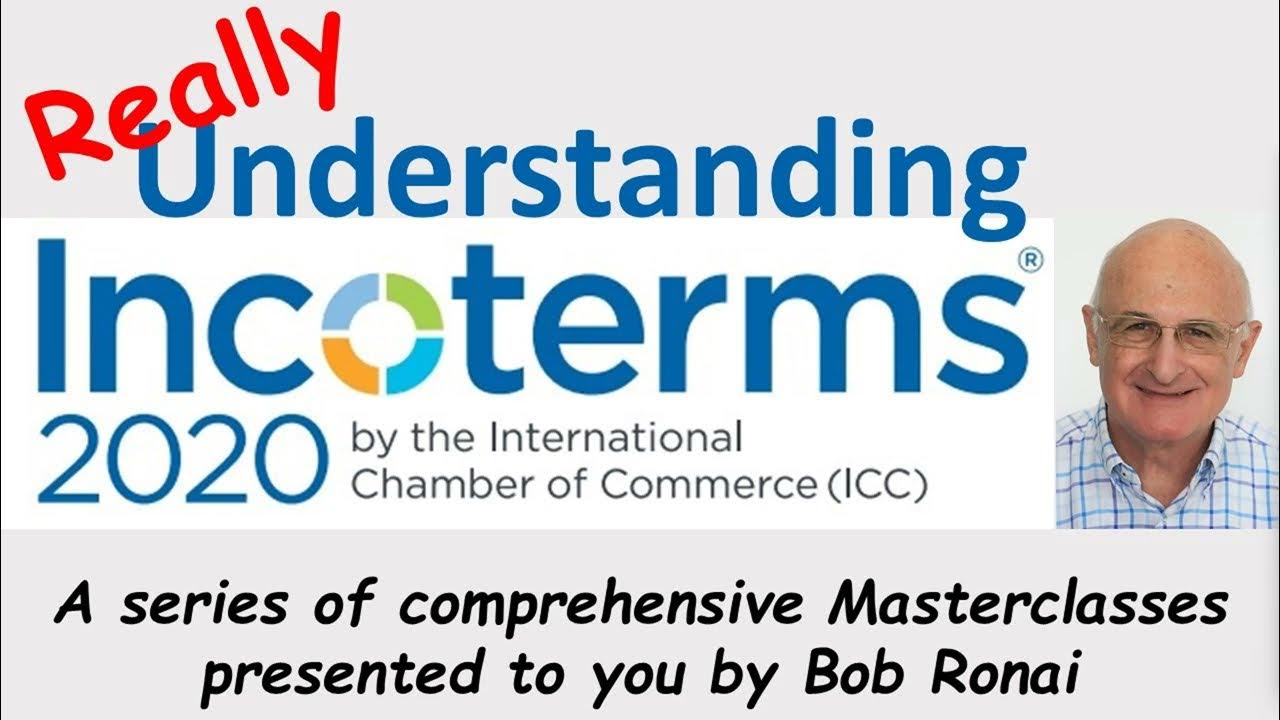Lesson 8 DAP DDP part 1
Summary
TLDRIn this lesson, Bob Ronai delves into the complexities of Incoterms 2020, specifically focusing on DAP (Delivered at Place) and DDP (Delivered Duty Paid). He explains key concepts such as delivery, taking delivery, and the challenges in applying these rules to different shipping methods like Full Container Load (FCL) and Less than Container Load (LCL). Bob offers insights into logistics, container handling, and the nuances of import/export formalities. His experience and practical approach aim to provide a deeper understanding of these rules, helping businesses navigate international trade more effectively.
Takeaways
- 😀 The DAP and DDP rules in Incoterms 2020 are complex and often misunderstood, especially when applied to FCLs, LCLs, and air freight.
- 😀 Incoterms 2020 rules primarily focus on land transport, particularly within a customs union, and are not well-suited for cross-ocean trades.
- 😀 Lesson 8 introduces the DAP and DDP rules with an emphasis on delivery, taking delivery, and the complexities surrounding them.
- 😀 The seller must deliver goods at the agreed point of destination on the arriving means of transport and ensure timely delivery according to the contract.
- 😀 Containers are treated separately from the goods inside them, and the seller must provide clear terms on container handling and costs in contracts.
- 😀 The seller is responsible for terminal handling charges and trucking costs to the buyer's premises under DAP, but the buyer handles import formalities.
- 😀 A major issue arises when the buyer fails to collect the container, leading to storage and detention charges, which the seller may incur.
- 😀 The contract should clearly specify terms such as free time for unloading, and the seller should cover the cost of any delays or detention charges.
- 😀 The DAP rule is inappropriate for LCLs at destination terminals, and the DPU rule should be applied instead for better clarity and ease of handling.
- 😀 The buyer is responsible for unloading goods from the container, while the seller ensures that the container is returned to the carrier's terminal.
- 😀 The logistics coordination between the seller's forwarder, customs broker, and local agents is vital for smooth delivery to the buyer’s premises, and any failure in coordination can lead to complications and additional charges.
Q & A
What is the main purpose of this masterclass series on Incoterms 2020?
-The main purpose of this series is to provide in-depth insights into Incoterms 2020, particularly focusing on complex rules like DAP (Delivered at Place) and DDP (Delivered Duty Paid), with the aim of passing on knowledge and experience for better trade understanding.
Why are DAP and DDP often misunderstood or misused?
-DAP and DDP are often misunderstood because they have been glossed over in the past, with many people trying to apply them to scenarios such as FCLs, LCLs, and air freight, which they were not originally designed for.
What is the problem with the DAP and DDP rules according to the speaker?
-The problem with the DAP and DDP rules is not in what the Incoterms 2020 book says, but in what it doesn't cover, particularly when it comes to handling containerized freight, FCLs, LCLs, and cross-ocean trade.
What are the main topics covered in this lesson?
-This lesson specifically focuses on the complex and contentious articles A2 and B2, which cover delivery and taking delivery, along with their options and challenges. The lesson will mainly focus on FCLs and LCLs.
What does A2 delivery entail in the context of DAP?
-A2 delivery in DAP requires the seller to place the goods at the disposal of the buyer on the arriving means of transport, ready for unloading at the agreed point of destination or by procuring the goods so delivered.
What is the distinction between a container and the goods inside it, according to the IMO/ILO/UN ECE code?
-According to the IMO/ILO/UN ECE code, a container is treated separately from the goods inside it. The container is not considered packaging for the goods, except in rare cases like when the container is owned by the shipper or consignee.
What should be specified in the contract when dealing with FCLs in a DAP agreement?
-The contract should clearly specify that from the moment the container arrives at the terminal, all terminal handling charges, storage, demurrage, and detention are for the buyer, and that the buyer is responsible for collecting and returning the empty container.
What should be considered when arranging delivery for LCL cargo under DAP rules?
-For LCL cargo under DAP rules, the contract should clearly specify the free time at the CFS, after which the buyer assumes responsibility for any storage, demurrage, or detention. The seller is responsible for the cost of transporting goods from the CFS to the buyer's premises.
Why is DAP not suitable for delivery at a Container Freight Station (CFS)?
-DAP is not suitable for delivery at a CFS because, under DAP, the buyer is responsible for unloading, whereas unloading at a CFS is typically handled by the carrier. Instead, the DPU rule is more appropriate for LCL cargo to a terminal.
How does the speaker describe the logistics complications at the destination?
-The speaker highlights multiple steps involved in the destination logistics, including coordination between the seller's forwarder, the buyer's customs broker, local agents, trucking companies, and the buyer, making it crucial to understand each party's responsibilities to avoid delays or additional costs.
Outlines

This section is available to paid users only. Please upgrade to access this part.
Upgrade NowMindmap

This section is available to paid users only. Please upgrade to access this part.
Upgrade NowKeywords

This section is available to paid users only. Please upgrade to access this part.
Upgrade NowHighlights

This section is available to paid users only. Please upgrade to access this part.
Upgrade NowTranscripts

This section is available to paid users only. Please upgrade to access this part.
Upgrade Now5.0 / 5 (0 votes)





